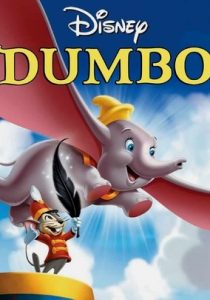Dumbo-1941
Director Ben Sharpsteen
Starring Various voices
Top 250 Films #138
Scott’s Review #559
Reviewed December 24, 2016
Grade: A
One of the best-produced (and at sixty-two minutes, one of the shortest) of the classic Walt Disney films of the golden age, Dumbo, in a similar fashion to another Disney classic, Bambi, is both heartbreaking and mixed with fun entertainment.
It should be heralded and viewed by everyone —children and adults alike —and teaches a valuable lesson in acceptance and tolerance, messages that never go out of fashion, despite the film being made in the grand old year of 1941.
To draw more comparisons to Bambi, we are introduced to the title character, Dumbo, who is nuzzled and cherished upon being brought into the world by storks by his warm and affectionate mother.
Dumbo is an elephant, and his mother is a circus elephant, where she spends her days as entertainment, along with a group of other female elephants —none of whom possess her grace, kindness, or dignity.
Sweet Dumbo is born with an imperfection- he has enormous ears. While others —namely the female elephants —ridicule and stare in horror at the lovable little elephant, his mother embraces and cuddles her little bundle of joy, eliciting a genuine, good-natured warmth rarely seen in cinematic history.
There is something innately good about this character (Mrs. Jumbo). She has a richness and way about her that is fantastic and consuming.
Sadly, one day, while entertaining the masses, a bratty human child taunts Dumbo, causing Mrs. Jumbo to go ballistic and immediately go into protection mode.
She was then deemed a “mad elephant”, shackled, chained, and worse yet- separated from her baby. How anyone can watch this portion of the film and not shed a tear or get a lump in their throat is beyond me.
Walt Disney was a master at eliciting raw emotion from his audience and writing heartbreaking yet charming stories.
The centerpiece of Dumbo is the extraordinary bond between mother and son —a sweet and powerful connection that almost everyone can relate to. The pride and joy in Mrs. Jumbo’s eyes when she is granted a visit from Dumbo while she is imprisoned is magical – it means the world to her.
The supporting characters are key to the richness of the film- Timothy Q. Mouse is an essential character in the story. Upon Dumbo and Mrs. Jumbo’s separation, he becomes Dumbo’s only friend, sympathizing with Dumbo, and is instrumental to Dumbo’s reunion with his mama as well as his future successes in the circus.
The bitchy female elephants are crucial, too- despite being one of their own, they still reject Dumbo and Mother. There are some light moments, such as when the ladies, (Catty, Giddy, and Prissy), gossip and act superior to others.
Another fun scene, to balance out the heavy drama, occurs when Timothy and Dumbo accidentally mistake champagne for water, causing them to hallucinate and imagine pink elephants.
Dumbo is essential in that it sends a powerful message about the way animals (especially circus animals) have historically been treated. Why animals should be used to amuse and entertain human beings is anyone’s guess, but this film serves as a powerful reminder of this.
Fortunately, the film has a happy and satisfying ending, which should please fans.
Dumbo (1941) is a timeless animated classic.
Oscar Nominations: 1 win-Best Scoring of a Musical Film (won), Best Original Song
